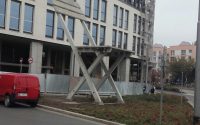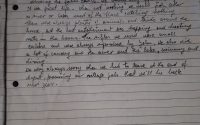A Flood of Information
I cannot say for certain exactly when I decided to resume the search for information about my family as it seemed to stretch out over a number of years beginning at the turn of the century. After Poland joined the EU in 2004 and the UK and Ireland decided to open up its labour market to Polish citizens, there was almost a rush overnight and in my own place of work, Polish and Slovak citizens began to take up posts. The first thing that amazed me was the excellent command of English they all had. In conversations with them I began to pick up useful information directly about the early eighties and how things had changed in a quantum leap. They were more interested in my story of having a father born Polish and his home city of Lwów. From them I learned that some too had parents born in lands that now belonged to Ukraine and Belarus and how all had been re-located to western Poland in the former German territories. These Poles were intrigued with my father’s own escape because they were very eager to learn about Poles who settled in the West. One striking thing they had in common was that not one ever asked why my father did not return to Poland after the war. What was also evident to me was how they had moved on from the war and I soon got the feeling there was much less animosity to Germans than there was in Britain, a country which was never occupied or brutalised.
Around this time Kraków became a popular place for a city break and my own family expressed and interest in going and this we did in 2005 while our children were still at school. As we sat waiting for our flight I remembered more than anything the boring unsatisfying food and the wooden seats on the local trains. What greeted me was a country which had left all that behind, presenting the tourist with dishes that were artistically presented and mouth watering. Gone were the Ladas, Moskviches and Volga cars which belched fumes and smelled the same. We had arrived in a country that was in a hurry. We encountered organisation, efficiency – certainly we were in a tourist spot – and hospitality not of the gushing variety. Claire asked me did I feel anything inside on seeing Kraków, namely being in my father’s homeland and I had to confess that although I was enjoying being there, I did not have any, I suppose, tingling sensation because at that time I had not realised that my father had lived in Kraków for a few years when my grandfather was stationed in the barracks in Kraków. Had we been in Lwów, that might have been different, I reasoned. The city was everything the tourist brochures had cracked it up to be; Wawel Castle, Wieliczka Salt Mines (a stunning array of salt sculptures including a chapel carved out of rock salt. Emma, my daughter even vowed to get married there one day!) and of course Auschwitz.

The latter left me with a few thoughts: utter disbelief where I was too shocked to be saddened, I was numb: the shocking scale of Auschwitz-Birkenau which housed the gas chambers: the realisation that the extermination of human being of the Jewish faith was on an industrial scale – trains ran to strict timetables to that one trainload of these unfortunate souls was decanted, selected for labour or death and the train then moved off somewhere else to repeat the process. Meanwhile their belongings collected and banked, recycled into by- products and even worse, human carcasses and hair made into soap, thread etc. from that moment I arrived at my own conclusion that the entire German nation could not be blamed for this as it was the exclusive work of the Nazis who just happened to be German or Austrian. It was not until years later that I learned of the collaboration of other occupied people in turning Jewish people over to the Nazis. Thankfully many more did not. I make no judgement on that because I have never lived under occupation or been brainwashed with nefarious propaganda as happened to the German people. More of this in a future blog. I did wonder if any of my relatives had been sent here to Auschwitz as political prisoners.
On returning home I began slowly to try and find out more information about my family, in the knowledge that I would not meet with obfuscation from the Polish authorities.
Around 2009, I wrote to the Red Cross to try to find any information about my grandfather, the Military Archive in Warsaw and to the Russian Federation to enquire if there were any records of my grandmother and aunt. I received a response to the latter which I have described in the blog entitled ‘No Official Papers. At this point I have to thank two Poles I met on a training course in 2010, Anna Niegodzika and Artur Kmiecik. Anna followed up on the information I received from Warsaw and it was then Anna told me that my father had been in the 20th Infantry Regiment based in Kraków. And so I realised my father did have a connection with Kraków! Artur translated my letter to the Russian authorities and and also their reply which is featured in the blog ‘No Official Papers’.
The breaching of the Berlin Wall in 1989, not only allowed people to flow freely, but also information and so it was that I received my grandfather’s military record without and difficulty. The only problem with it is that it is all handwritten in almost minuscule script as my grandfather had a long story to tell – and this was all before the outbreak of WW2! I will at some point endeavour to reveal its contents. Even native Polish speakers are having difficulty in reading the writing. From 2009 until 2012, I received correspondence from the Red Cross which added a new piece of information and then in October 2012, a breakthrough. The Polish Red Cross had been able to establish that my grandfather had indeed been repatriated to Poland in 1947 and was still alive and working for the Forestry Commission in Wałcz in western Poland. This town is located roughly between Szczecin and Poznań. The testimony that my grandfather gave to the Polish authorities is enclosed below.
questionnaireTranslation
questionnaire-englishThis information was followed up with confirmation that he died in Wałcz in 1957. around the same time, I received help from another Polish friend, Anna Miszarz, who helped me obtain a copy of my grandmother’s death certificate confirming she had died in Żory in 1960.
dc-1 dc-2Buoyed by this flood of information, I tried my luck at finding the exact whereabouts of my aunt, Aldona, who died in Tashkent in present day Uzbekistan, I believe around 1942, whilst on the route from Siberia to British controlled Palestine, with Anders’ Army. The Red Cross advised me not to expect an answer too quickly, which I didn’t. This has turned out to be the case as the search continues.
Shortly after receiving all this information, I decided it was time to find out things for myself to try to flesh out the bones of the information I had just received. My starting point was not Poland or Germany but Ukraine.
End


